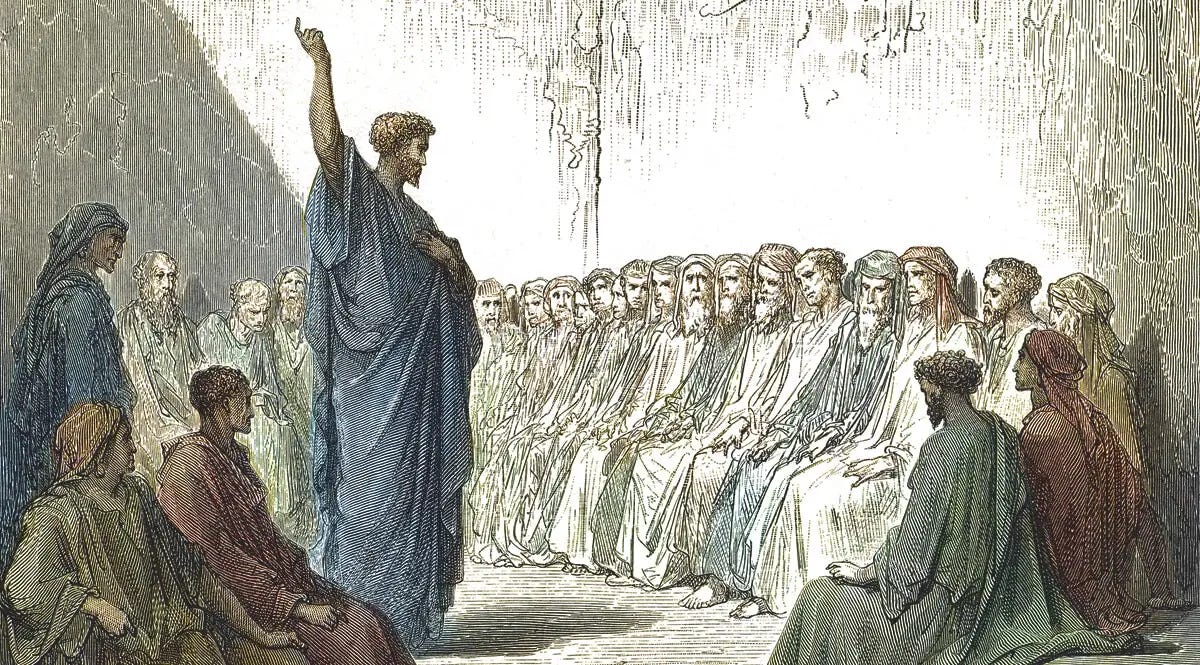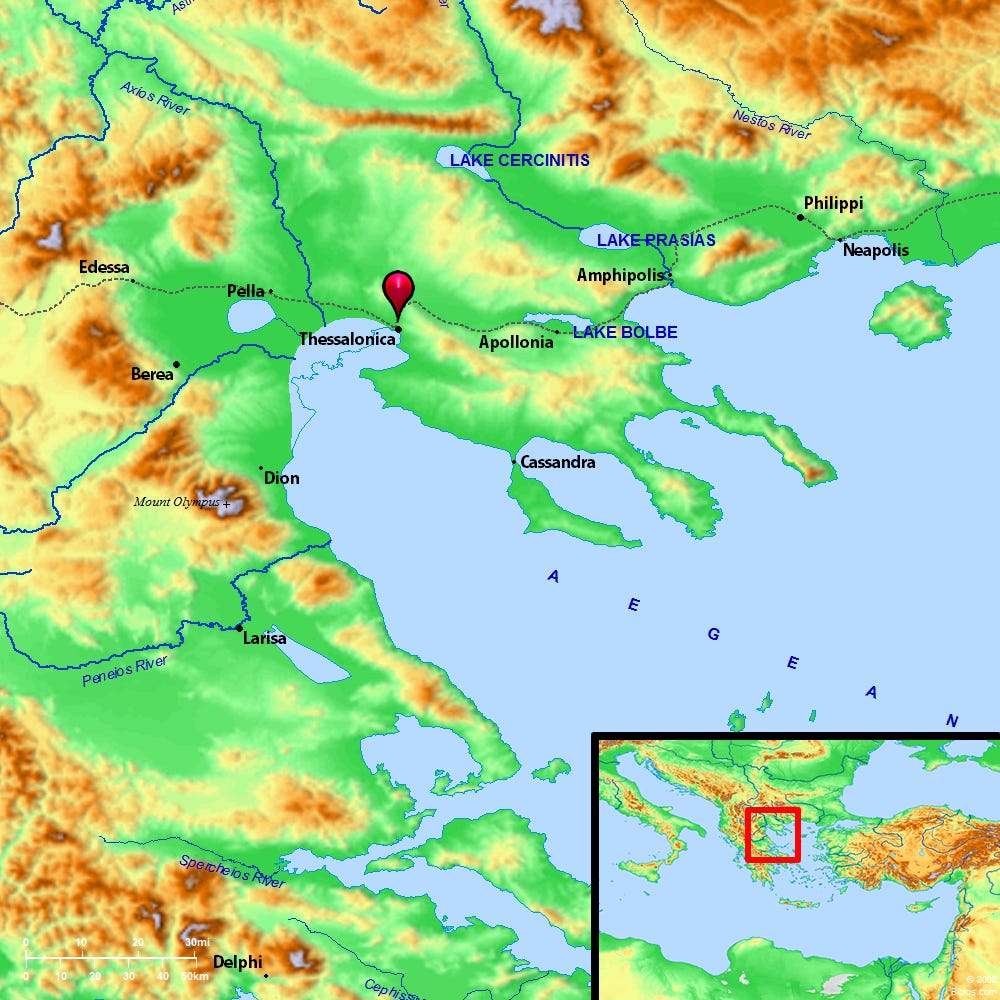A Study of Acts: Preaching in Thessalonica
Acts 17:1-4 - Paul reasons to another synagogue group, resulting in success with many who are persuaded of the truth of Christ.
“Now when they had traveled through Amphipolis and Apollonia, they came to Thessalonica, where there was a synagogue of the Jews. And according to Paul’s custom, he went to them, and for three Sabbaths reasoned with them from the Scriptures, explaining and giving evidence that the Christ had to suffer and rise again from the dead, and saying, “This Jesus whom I am proclaiming to you is the Christ.” And some of them were persuaded and joined Paul and Silas, along with a large number of the God-fearing Greeks and a number of the leading women.”
Acts 17:1-4 NASB1995
Paul and Silas continue their journey. Luke is writing in the third person again so he probably stayed in Philippi. Let’s look at the journey from Bibleatlas.org:
You can see Philippi to the right and it is described in the passage that they travel west through Amphipolis and Apollonia to reach Thessalonica. The total distance from Philippi to Thessalonica was about 100 miles, so it is likely that they stopped for a night in each of the two towns that are mentioned (there is no evidence that they preached in those towns).
So what do we know about Thessalonica? Here’s a short summary about this city from Precept Austin:
The city of Thessalonica, located on the Via Egnatia, was 267 miles from the Adriatic coast [and on the Aegean Coast], about halfway along the Via Egnatia. It had become a “free city” in 42 B.C. and with its warm springs (Thermae) and public buildings around a market place (Agora), linked to a stoa, it was one of the most heavily populated cites of the area. This city was the capital of the province of Macedonia and had a population of some 200,000. It was a major seaport city and an important commercial center, rivaled only by Corinth in this area of the world. Thessalonica was located on several important trade routes, and it boasted an excellent harbor. The city was predominantly Greek, even though it was controlled by Rome. Thessalonica was a “free city,” which meant that it had an elected citizens’ assembly, it could mint its own coins, and it had no Roman garrison within its walls. Modern Thessaloniki is still a significant city in Greece.
As is Paul’s custom, he finds the synagogue first and “reasons” with the Jews and God-fearing Greeks attending for three Sabbaths about the Christ. That does not necessarily mean that he and Silas were only in Thessalonica for three weeks or that these were the only opportunities that he had to preach.
Let’s do a word study! Reason comes from the Greek verb διαλέγομαι or dialégomai and it has the following Biblical usages:
to think different things with one's self, mingle thought with thought
to ponder, revolve in mind
to converse, discourse with one, argue, discuss
As we will see, this word is used several times in Acts 17 on this part of the journey. Paul is appealing to the intellect of his listeners in his arguments by showing them and dialoguing with them that the Scripture gives overwhelming evidence for Jesus being the Christ. This evidence is that He suffered and died and, most importantly, was resurrected. Many are persuaded by Paul’s arguments, including a large number of God-fearing Greeks and a number of the leading women.
It’s interesting that the influential women are mentioned (it’s a Luke trademark to talk about and include women in his writings), because many outside the Christian belief look at Paul as being a misogynist due to the fact that he wrote about women being silent and submissive to their husbands and not teaching men. However, as we can see in actual practice, the women are probably just as important to his evangelism as the men. The women can pass on the teachings to their children or persuade skeptical husbands of the truth in the unique ways that married couples have of communicating things of importance. Also, according to several commentators, women in the Macedonia area apparently had more personal freedom and importance than women in historical Greece and Rome districts.
Let’s look at commentary from Enduring Word about this passage:
They came to Thessalonica: This was an important port city, about 100 miles (160 kilometers) and a three-day walk from Philippi. Modern Thessaloniki is still a large, thriving city.
As his custom was: Paul first went to the synagogue, and preached Jesus crucified and risen again to the Jews and God-fearing Gentiles there. There were several notable aspects to his presentation of Jesus.
Paul reasoned with them from the Scriptures; “The Greek word translated ‘reasoned’ is the root for our English word dialogue. There was exchange, questions and answers. He dialogued with them ‘from the Scriptures.’” (R. Kent Hughes)
Paul did the work of explaining; “This word literally means ‘opening’…Paul opened the Scriptures with clarity and simplicity.” (R. Kent Hughes)
Paul did the work of demonstrating that the Christ had to suffer and rise again from the dead; “’Giving evidence’ (NASB; ‘proving,’ NIV), which means ‘to place beside’ or ‘to set before.’” (R. Kent Hughes) The idea is of presenting persuasive evidence to listeners.
Paul emphasized in all this who Jesus is (This Jesus whom I preach to you is the Christ) and what He did for them (suffer and rise again from the dead).
Some of them were persuaded: Among the hearers, there was a good response from some. Most of those – actually, a great multitude – were devout Greeks, but also many prominent Jewish women (not a few of the leading women). By all accounts, the work was a success: a great multitude believed… not a few.
When Paul was in Thessalonica, he received financial support from the Christians in Philippi (Philippians 4:15-16). They helped with this successful work among the Thessalonians.
This seems like a great success so far, but as we will see in my next devotional, Paul and Silas are once again beset by an angry and jealous mob (Acts 17:5-9).
Heaven on Wheels Daily Prayer:
Dear Lord - I thank You that reason and intellect have important roles to play in persuading others of the truth of Scripture. Amen.
Scripture quotations taken from the (NASB®) New American Standard Bible®, Copyright © 1960, 1971, 1977, 1995 by The Lockman Foundation. Used by permission. All rights reserved. lockman.org
Bibleatlas.org was accessed on 11/29/2024 to review maps for Thessalonica.
Precept Austin was accessed on 11/29/2024 to review commentary for Acts 17:1-4.
The Blue Letter Bible was accessed on 11/29/2024 to review the lexicon for reason.
Commentary from Enduring Word by David Guzik is used with written permission.




